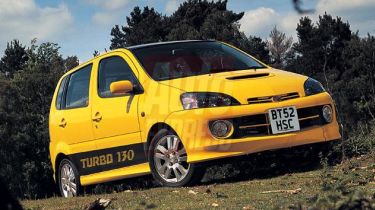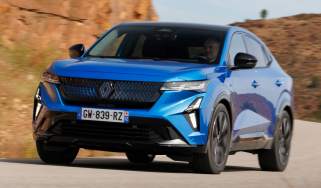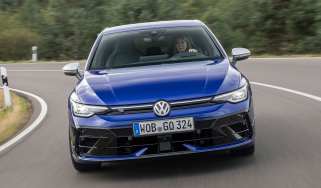Daihatsu YRV Turbo 130
Subtle is not a word that the designers at Daihatsu are familiar with. Following the decision to bring the distinctive Copen roadster to the UK, bosses will now import this banzai turbocharged version of the seemingly sensible YRV to create a bizarre hot hatch.
The YRV has never found its place in the UK car market, but this turbocharged version should attract new buyers. Don't expect fine handling, but straight-line speed is blistering and the car's practical packaging is very underrated. What's more, the Turbo 130 is great value for money.
Subtle is not a word that the designers at Daihatsu are familiar with. Following the decision to bring the distinctive Copen roadster to the UK, bosses will now import this banzai turbocharged version of the seemingly sensible YRV to create a bizarre hot hatch.
The company is no stranger to producing thrilling performance versions of small cars, with the late Eighties Charade GTti and subsequent Cuore Avan-zato achieving a dedicated following. But is the YRV a worthy successor?
As with all Japanese pocket rockets, performance never seems to correlate with engine capacity. Underneath the YRV's bonnet is a 1.3-litre unit, but thanks to a turbocharger and Dynamic Variable Valve Timing, an output of 127bhp is achieved, making this the most powerful 1.3 on sale in the UK.
That means the YRV blasts from 0-60mph in 8.1 seconds, going on to a maximum speed of 112mph. The first time you push the accelerator, you are in for a real surprise - the Daihatsu feels genuinely quick. At high revs the whistling turbocharger makes its presence felt, but peak torque of 170Nm comes at 2,800rpm, adding flexibility to the impressive powerplant.
Used - available now

2021 Toyota
RAV4 Hybrid
37,292 milesAutomaticPetrol2.5L
Cash £24,935
2018 Nissan
Qashqai
53,834 milesManualDiesel1.5L
Cash £9,188
2019 Ford
EcoSport
43,831 milesAutomaticPetrol1.0L
Cash £11,900
2021 Hyundai
Ioniq electric
20,742 milesAutomaticElectric
Cash £12,800Unfortunately, the performance is muted by a standard four-speed automatic gearbox, which is likely to be a turn-off for British buyers who are used to five ratios. The clumsy transmission has Daihatsu's 'steershift' system, with steering wheel-mounted buttons to swap cogs manually, although the switches are poorly positioned and difficult to operate on a twisty road.
The gearlever can also be used to hold gears manually the old-fashioned way, which is often easier than working the full sequential override. Uprated suspension front and rear helps the YRV cope with the extra power, and an anti-roll bar tidies the handling even more. However, this is no sports car. Turn in to a corner and body roll is controlled, but the steering lacks feel and the ride is very harsh. Yet anyone who does a lot of city driving will find the light steering and tight turning circle invaluable.
How a hot hatch looks is just as important as the way it drives, though. Apart from the Seventies-style garish black stripe down the sides, the modifications to the YRV are genuinely sporty and give it real presence among its high-performance hatch rivals, even if the tall body and five doors aren't an obvious choice for a racy model.
At the front, a gaping air intake incorporates large foglamps, while 10-spoke alloys plus twin exhaust pipes finish the makeover. Inside, the roomy cabin is still one of the most practical in the class, but the Turbo 130 gets plenty of extra goodies. Along with an aluminium footrest, there's a panoramic sunroof, a leather-trimmed steering wheel and gearlever, plus Formula One-style change-up lights which alter from green to red as the revs soar to nearly 7,000rpm. The equipment tally is comprehensive, too, with air-con, four electric windows, ABS and electronic brake-force distribution fitted as standard.
So what does all this cost? It's only when you realise that the YRV Turbo is priced £10,995 that it starts to make real sense. Getting this sort of straight-line pace for the money isn't easy, but the boy racer's favourite is still Citroen's £12,000 Saxo VTS, which accelerates from 0-60mph in only 7.8 seconds. The YRV looks good until you consider Citroen's current £2,005 cashback deal, plus the year's free insurance cover it is offering to drivers aged 21-80. This package beats the YRV hands down for fun on a shoestring budget.
What the Daihatsu can do is return a frugal 40.4mpg - that's 5mpg more than the VTS - and help to limit insurance costs with a group eight rating, compared with the Citroen's 14.
In traditional Japanese style, the YRV Turbo 130 promises much and delivers more than you might expect. If handling dynamics are not your top priority, the newcomer is definitely worth a try, as it makes a more individual and economical alternative to the more popular budget hot hatchbacks on offer.






